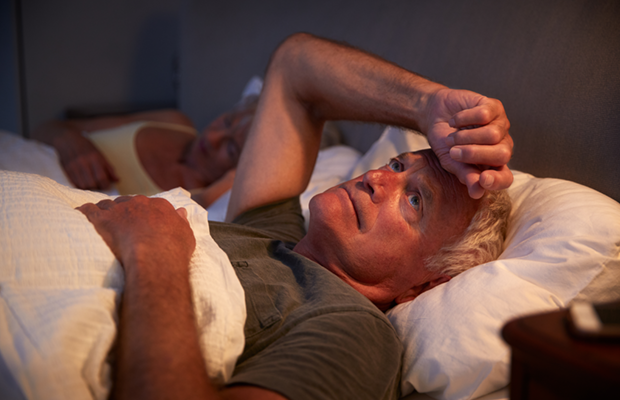
Do warmer nights raise the risk of death from heart and circulatory disease?
Men in their early 60s have a higher risk of dying from cardiovascular disease on hotter than usual summer nights, according to new research. We look behind the headlines.


Warmer summer nights could increase the risk of deaths from heart attacks and strokes in men aged 60 to 64, according to new research.
A rise of just 1°C above usual summer night-time temperatures could be linked to an increase in the risk of deaths from cardiovascular disease (CVD) in men in this age group. The research, published in the journal BMJ Open, only looked at people in their 60s, and the same rise in temperature wasn't linked with an increased risk in men aged 65-69, or in women in either age group.
These results were found by comparing the weather in June and July from 2001 to 2015 with information from the Office of National Statistics on the roughly 40,000 people in England and Wales who died from CVD in this period. The increase in risk from each 1°C rise above average monthly night-time temperature was found to be 3.1 per cent, but in the context of typical UK summer weather (during the study temperatures never rose more than 1.7°C above average) this increase in risk is small.
The study also looked at King County, an area in Washington State in the USA with similar weather to the UK, where, like the UK, few homes have air conditioning. This part of the study looked at around 500 deaths from CVD and only included men. They found each 1°C rise was linked with a 4.8 per cent increase in the risk of CVD deaths in men aged 60-64.
Want to get fit and healthy?
Sign up to our fortnightly Heart Matters newsletter to receive healthy recipes, new activity ideas, and expert tips for managing your health. Joining is free and takes two minutes.
I’d like to sign upHow good was the research?
While previous studies have shown a relationship between summer night-time temperatures and the risk of dying from CVD, they had not showed how differences in age and sex could affect this.
A strength of this study is the large number of people it included, drawing on reliable data from government sources in the UK and USA. The researchers adjusted for some other factors that can affect the risk of dying from CVD, although we can’t be certain that all other factors that could have influenced the results have been adequately taken into account.
This kind of study is observational, so can't prove that warmer-than-usual nights directly cause more CVD deaths.
The researchers said that one explanation for the findings could be that warm nights often mean people sleep less well, and sleep deprivation is a risk factor for heart disease.
They also suggested that the reason the rise in risk was only seen in could be because men generally have larger sweat glands, so may lose more fluid through sweat, which could affect the heart and circulatory system. But they also said it’s possible that there were not enough female deaths from CVD in the study for any issues to be visible (nearly 70 per cent of the CVD deaths recorded in England and Wales in the study were men, and only men were included in the American part of the study).
The researchers suggested that a possible reason why there appeared to be no increase in risk for men aged 65-69 might be because of declining testosterone levels (studies in mice have suggested that testosterone can be linked to being more susceptible to damaging effects of heat), or because men who survived to this age might have more resilience.
How good was the media coverage?
The Times, the Mail Online and the Guardian all covered this story in a generally accurate and balanced way, although the Mail’s reference to “muggy nights” in its headline could be misleading – the study did not look at levels of humidity and in fact the researchers discussed how dry air might contribute to “obstructive sleep apnoea, which can trigger nocturnal CVD events”. The Mail also suggested that the research applied to “men in their 60s” and was not explicit that the link wasn’t found in those aged 65-69.
The Times and the Mail included helpful quotes from the study’s authors and experts from the BHF. The Times also shared some of the researchers’ theories as to why there might be an increased risk in men aged 60 to 64, but not in women. None of the three papers shared included the researchers’ theories as to why there might be a difference between men aged 60 to 64 and those aged 65 to 69.
The BHF verdict
Julie Ward, Senior Cardiac Nurse at the British Heart Foundation, said: “This research adds to existing evidence that warmer temperatures during the summer can affect the heart, increasing the risk of health complications and even death in people with cardiovascular disease.
"However, this study is observational, so it can’t show us cause and effect. It also only provides data up until 2015. More research is now needed to understand why this small rise in night-time temperature affects men and women differently, and if this association is still observed in more recent years.
"Your body has to work harder in warmer weather to keep its core temperature to normal levels, putting extra strain on your heart. The most important things you can do to protect your heart during the warm summer nights are to stay cool and keep hydrated. Try to keep your home cool in the daytime by closing curtains to stop the sun coming in, keep a glass of water close to you at night to avoid being dehydrated, and wear loose fitting cotton-based pyjamas.”
What to read next...
Hot weather and your heart




